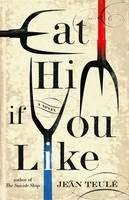Wednesday, 5 February 2014
Eat Him if You Like and Under the Sun
Two quite different books here, and yet both equally wonderful in their own way. Jean Teule's 'Eat Him if You Like' is a short little novel that gives a frank view of a truly disgusting incident from, relatively recent, French history. The story follows Alain de Moneys, a deputy mayor and upstanding young man, as he visits a local fair in August 1870. Once there he has friendly conversations with several of the local peasants, he has been a personal benefactor to many of them, and is happily going about his business. After a while he comes to the defence of his cousin, who has been accused of having pro-Prussian sympathies. This causes the crowd to turn upon de Moneys; the crowd swiftly become a mob who precede to beat him, brutally torture him and, after dragging him around the village light a bonfire over his body burning him to death. As you can imagine this is not exactly light reading. The story is mainly told from the point of view of de Moneys, so in that sense is a fiction. However it remains faithful to the events of the case. There is the gore, and brutal violence that you would expect from a story of this nature. Violence that is all the more horrific due to the way in which 'mob mentality' so quickly takes hold, and due to the close proximity to our own age. It seems ridiculous that events like this could take place as late as the 1870's, but then it also seems slightly insane that Western Europeans could accurately be described as peasants at this point in time too. No matter how much Zola you may read this still seems as though it should be set in a far more distant time or place. reading this has reaffirmed my desire to dig out some Zola, or maybe Huxley's 'Devil's of Loudon' and read some more about the brutality of the French Peasantry.
Moving on the 'Under the Sun' bu Justin Kerr-Smiley; unlike 19th century France which seems as though it should be modern and similar to Britain, Japan and Japanese culture is always presented with a frisson of difference. The Japanese are so often presented as incredibly alien and quite literally inscrutable, so it was refreshing to read a Pacific war story that had a focus on mutual respect and understanding. The novel is the story of the friendship that blossoms between Strickland, a downed RAF pilot, Captain Hayama, the Japanese officer who captures him, and Ito, the Christian orderly who cares for them both. The start of the novel is packed full of cliches; every Battle of Britain cliche available is used and the story feels weaker for it, however once you get past this section the story evolves and blossoms into something quite beautiful. Hayama embodies the code of the Samurai in everything that he does, from acceptance of brutality when he feels it is part of his duty to his Emperor, to the joy he expresses in simple pleasures like sharing a dish of sake. By showing Hayama in this way Kerr-Smiley manages to subtly draw comparisons with European chivalry, showing the Code as something with true honour. It does not seem that this is something that is often present in Western views of the code, probably because it was so misused and misinterpreted during the atrocities of the Pacific war. Here it seems to be a natural and beautiful thing. I couldn't help thinking of films like, the incredible Twilight Samurai, as I read this. Although I must admit that John Man's 'Samurai: The Last Warrior' (the inspiration for the film 'The Last Samurai'), also came to mind. By the end of the novel I found myself in the interesting position of really hoping that one character would kill the other, this was the only honourable and satisfactory outcome I could see. A wonderful book.
Subscribe to:
Post Comments (Atom)


No comments:
Post a Comment